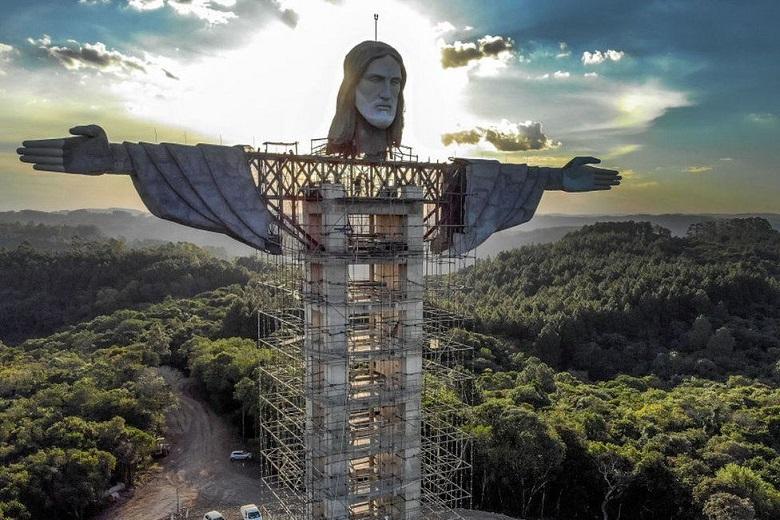Ninety years ago, a statue of Christ the Redeemer was unveiled in Rio de Janeiro. It towered above the city to the clouds with his hands outstretched for blessing. The figure immediately became the main symbol of Rio and the hallmark of the whole of Brazil.
Today, in another Brazilian city, they decided to erect a new statue of Christ. It should rise above the famous Redeemer Monument in Rio de Janeiro. Exciting details of constructing the new and curious facts about the legendary sculpture, further in the review.
Impressive monument promises to be higher
A new statue of Christ the Protector is being erected in the southern city of Encantado. It will be 43 meters high with a pedestal. With this size, the figure will become the third tallest statue of Jesus in the world.
The construction of the impressive sculpture began back in 2019. The initiator was the mayor of the city, Adroaldo Conzatti. The politician personally monitored the production of work, which is scheduled to be completed this year. Unfortunately, Cozatti himself will not see this anymore; he died in March from Covid-19.
The Friends of Christ Association declares that they will try their best to complete this year. Experts estimate its cost at $350,000. The construction is financed entirely by donations from individuals and companies.
The figure promises to be incredibly impressive. The distance from one palm to the other is 36 meters. An elevator will be installed inside, which will take tourists to the observation deck in the area of the figure’s chest at the height of 40 meters. There are only two above this monument in the world. One in Indonesia is the statue of Jesus Buntu Burake in Sulawesi; its height is 52.55 meters. Another is the statue of Christ the King in the Polish city of Swiebodzin, 52.5 meters high. They are all above the iconic sculpture of Christ the Redeemer in Rio. Of course, dozens of other statues in the world are higher, including several monuments of the Virgin Mary and numerous Buddhas, but they are not so famous.
People’s Christ
The money for the creation of the famous statue was collected from the world on a string. The idea of installing a religious building was born in 1921. It all came down to a lack of funding. The enthusiasts decided to organize a special event, “Monument Week”. The Brazilians were so impressed by this idea that in a record short time, they raised an incredibly massive amount in those years – $ 250,000.
Heroic sculptors
A whole team of craftsmen worked on the implementation of such a large-scale project. The first version of the sketch was created by the artist Carlos Oswald. According to his idea, the globe was supposed to serve as a pedestal for the monument. This was intended to show the whole world that everything that exists is in the hands of the Lord. This undoubtedly impressive idea had to be abandoned in the end due to the incredible complexity of its implementation.
Brazilian engineer Heitor da Silva Costa made the final sketch of the sculpture. Costa, Pedro Viana and Heitor made all calculations required. The construction was going on (and this is a whole ten years!); enthusiasts lived right on the top of the mountain, having built a canopy in the forest.
The statue is invulnerable
This statement arose for a reason. Lightning strikes the figure of Christ the Redeemer very often. It was just a miracle that they could not do any harm to the figure. This status for the sculpture was entrenched after the historical storm that played out in Rio on July 10, 2010. The wind, madly, tore off roofs from houses and fell trees. The Jesus monument remained unharmed.
Believing Christians saw God’s providence in this. Non-believers were more sceptical about the laws of physics. Part of the monument was built from the so-called “soapstone”. This mineral has dielectric properties. Physics is physics, and no one is immune from annoying accidents, and the statue is no exception. Nevertheless, it was left without even insignificant harm.
A chapel was placed on the pedestal
The marble pedestal at the base of the sculpture hides the actual chapel itself. It is modest in size, but all the prescribed religious events are held there: prayers, memorial services, weddings, christenings. Initially, there was no chapel in the project. It was completed much later, timed to coincide with the 75th anniversary of the statue. The chapel was named in honour of the heavenly patroness of Brazil, which is Our Lady of Aparecida.
Roman light
After the statue was opened, they decided to make the structure even more impressive by installing lighting. Wanting to give the idea of spirituality, the Brazilians invited a specialist from distant Rome. The solution was implemented using short radio waves. The signal was broadcast at a distance of almost 10,000 kilometres.
Everything worked perfectly; multi-coloured spotlights made Christ the Redeemer statue look incredibly impressive in the evening and at night. The main attraction of Rio has acquired even more charm as a result. Unfortunately, the system crashed during a heavy downpour. The light blinked, then ignited, then extinguished. As a result, Rome had to be abandoned in this regard, and the lighting began to be controlled directly from Rio.
